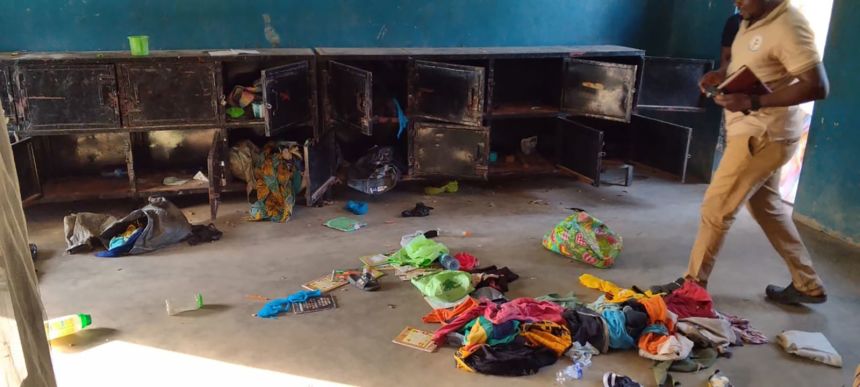The Reign of Terror: Security Fears Soar in Nigeria After the Mass Kidnapping of Over 300 Schoolchildren
The horrific news emanating from Nigeria’s Niger State has once again cast a devastating spotlight on the country’s spiraling security crisis. In a brutal and highly organized attack on St. Mary’s co-educational school in the remote community of Papiri, more than 300 students and 12 staff members were abducted by heavily armed gunmen in the early hours of Friday, November 21, 2025. This incident—one of the largest mass kidnappings in Nigeria’s history—is the latest in a relentless wave of violence that is paralyzing education, fueling economic instability, and shattering public trust in the state’s ability to protect its most vulnerable citizens.
The sheer scale of the operation, targeting a Catholic institution in the nation’s Middle Belt, has intensified domestic and international alarm. The attack occurred just days after 25 schoolgirls were kidnapped from a boarding school in neighboring Kebbi State, confirming a tragic pattern: Nigeria’s schools are now strategic targets in a devastating kidnapping-for-ransom economy. As the search operation begins and frantic parents await news, the incident serves as a grim reminder of the 2014 Chibok tragedy and the enduring vulnerability of West Africa’s most populous nation to violent extremism and organized crime.
The Anatomy of the Attack: Targeting Vulnerability
The raid on St. Mary’s was carried out with chilling precision, highlighting the tactical sophistication of the assailants and the dire lack of security in rural schools. The school, a boarding facility, was targeted during the pre-dawn hours when students, aged between 10 and 18 years, were most vulnerable in their dormitories.
The Scale and Scope of the Abduction
According to reports from the Christian Association of Nigeria (CAN) in Niger State, the gunmen operated aggressively and without interruption for nearly three hours, seizing a massive number of pupils and teachers. The total number abducted, initially reported as 227, was later verified by school authorities to be 303 students and 12 teachers, which represents almost half of the school’s total enrollment.
- Exploiting Isolation: The school’s remote location, near a major road but in a region with limited government and security presence, made it an easy, high-value target.
- The Element of Surprise: Attacking in the early morning ensures maximum impact, enabling the assailants to overwhelm the minimal security measures usually in place at rural schools.
- Initial Escapes: Fortunately, as of Sunday, November 23, approximately 50 pupils managed to escape individually between Friday and Saturday, navigating the chaos to reunite with their anguished families. This offers a small glimmer of hope amidst the crisis.
The Profile of the Perpetrators
While no group has yet formally claimed responsibility for the abduction, security analysts point to the involvement of two main types of armed groups operating in Nigeria’s northern and central regions:
- Criminal Bandit Gangs: These are highly armed groups, often former herders engaged in resource conflict, who have turned kidnapping into a lucrative form of organized crime. Their motivation is overwhelmingly financial gain—kidnapping for ransom—and they often target schools because they are “strategic” targets that draw massive public attention, increasing the pressure to pay.
- Jihadist Groups (Boko Haram/ISWAP): Groups like Boko Haram (whose name roughly translates to “Western education is forbidden”) explicitly target schools to signal their opposition to secular education and government authority. There is a growing, alarming concern about an increasing alliance between the financially motivated bandits and the ideologically driven jihadists, which significantly complicates the security landscape.
The absence of consequences for perpetrators, often due to a weak state presence, corruption, and a lack of effective law enforcement, is cited by experts as the primary factor fueling these mass attacks.
The Collateral Damage: A Nation in Fear
The mass abduction of schoolchildren carries profound societal, educational, and economic consequences that undermine the foundational stability of Nigeria.
The Crisis in Education
The most immediate and heartbreaking impact is the disruption of education.
- School Closures: In response to the wave of attacks, Niger State Governor Mohammed Umar Bago ordered the immediate closure of all schools in the state. The national education ministry also directed the closure of 47 boarding secondary schools across the country as a precaution. This mass shutdown, while necessary for safety, robs thousands of children of their fundamental right to education.
- Psychological Trauma: The repeated targeting of schools inflicts widespread psychological trauma on students, teachers, and parents. The constant fear of abduction leads to high levels of anxiety and, for many, the permanent abandonment of schooling, creating a generation of youth deprived of opportunity.
- Displacement: The insecurity triggers significant internal displacement, as families flee volatile rural areas to seek safety in towns, overwhelming urban infrastructure and social services.
The Economic and Social Strain
The kidnapping industry has become a significant, albeit informal, part of the northern Nigerian economy, with devastating effects:
- Ransom Economy: Though the Nigerian government has outlawed the payment of ransoms, desperate parents and local communities frequently pay large sums to secure the release of their loved ones. This influx of cash further incentivizes the criminal gangs, providing them with the capital to purchase more sophisticated weapons and fuel the cycle of violence.
- Investment Chill: The chronic insecurity deters local and foreign investment in the affected regions, particularly in crucial sectors like agriculture, mining, and education, thereby exacerbating poverty and class gaps, which are themselves root causes of the conflict.
- Erosion of Trust: Each mass kidnapping further erodes the public’s trust in the government and security forces. Citizens increasingly feel abandoned and unprotected, leading to calls for community self-defense and potentially wider internal conflict.
International & Political Pressure: A Global Alarm
The attack comes amid intense scrutiny and pressure from the international community and domestic political rivals, putting the administration of President Bola Tinubu under immense strain.
The Papal and Global Appeal
The scale of the crisis has drawn attention from the highest levels of global leadership:
- Pope Leo XIV’s Appeal: Pope Leo XIV expressed deep sadness over the abduction and made a “heartfelt appeal” for the immediate release of the hostages, urging competent authorities to take “appropriate and timely decisions” to ensure their freedom. This religious focus highlights the vulnerability of Christian institutions, though victims of these attacks come from all faiths.
- Save the Children Analysis: The global organization Save the Children noted that attacks on schools, teachers, and students in conflict zones have nearly tripled in the past five years globally, emphasizing that the Nigeria kidnappings are a stark demonstration of this alarming global trend, despite the Safe School Declaration signed by many nations.
The US and the Persecution Debate
The crisis is also playing out against the backdrop of a heated diplomatic row between Nigeria and the US Administration.
- Trump’s Classification: The US President, Donald Trump, recently classified Nigeria as a “Country of Particular Concern (CPC)” and has repeatedly claimed that the violence is a “mass slaughter” of Christians by “radical Islamists,” even threatening to deploy US military force if Nigeria fails to act.
- Nigeria’s Rebuttal: The Nigerian government and many experts have consistently rejected this simplistic narrative, stating that victims of armed groups come from all faiths, including the majority Muslim population in the North, and that much of the violence is driven by complex factors like resource competition, land disputes, and criminality, not solely religious ideology. This nuanced reality is often lost in international media, yet the political consequences of the US stance are significant, including threats to cut off foreign aid.
Live Daily Information: Monday, November 24, 2025
As of today, Monday, November 24, 2025, the situation remains critical, defined by ongoing search efforts and the agonizing wait for families.
- Hostages Status: The confirmed number of students and staff still being held by the kidnappers is approximately 253 schoolchildren and 12 staff members. The 50 students who escaped have provided crucial, though limited, intelligence to security forces.
- Government Action: President Tinubu’s government has attributed the recent freedom of other hostages (from an unrelated church attack in Kwara state) to the efforts of security agencies but has provided few public updates on the rescue efforts for the Niger State students. The government has deployed tactical squads alongside local hunters to scour the vast forests where the gangs are known to hide, but the lack of concrete progress fuels public anxiety.
- Community Vigilance: In many affected communities, the school closures and heightened fear have led to calls for increased community engagement and better intelligence gathering to prevent future attacks. Parents and local leaders continue to organize prayer vigils and are central to the desperate effort to locate and secure the hostages.





